With transplant changes afoot, Rotary members push to end global organ shortages
Anil Srivatsa drives an SUV plastered with stickers and slogans across India on a quixotic mission: to teach as many of the country’s 1.4 billion people as he can about the importance of organ donation.
He’s one man in his truck, often accompanied by his wife, driving from town to town for several weeks each year to try to increase India’s organ donation rate, because it ranks among the world’s worst. “There is a deep cultural bias against organ donation in India,” says Srivatsa, a media entrepreneur who helped found the Rotary Club of Organ Donation in 2022. “There is much work to be done in this space, to counter misinformation and fear.”
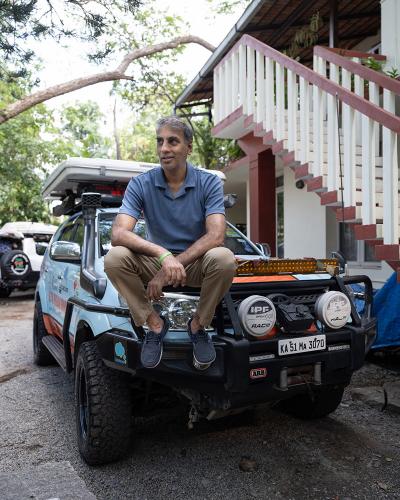
Anil Srivatsa, who tells his kidney donor story to make people feel more comfortable about giving, is pushing Rotary members to new levels of advocacy for organ donation.
Image credit: Gayatri Ganju
For Srivatsa, the mission is intensely personal. Ten years ago, he donated his left kidney to his brother, Arjun Srivatsa, a neurosurgeon and a member of the Rotary Club of Bangalore, who had chronic renal failure. On his driving tours, Srivatsa sleeps in a rooftop pop-up tent on his SUV. One of its decals says “Kidney donors are sexy!” He speaks to a Rotary club if there is one in town — there are more than 4,000 in the country — or he assembles what residents he can when there’s not.
India trails most of the world in organ donation for varied, sometimes complicated reasons, including a simple lack of information, inadequate transplant care hospitals in rural areas, and distrust among families of potential donors about how organs will be used. But major shifts are happening with donation regulations and initiatives in India and other countries, giving organ donation its strongest spotlight in years. That includes attention affixed on early experiments in the U.S. and China with transplanting gene-modified pig organs into humans as one potential solution for shortages. And a 2023 U.S. law that will overhaul the national donation system to try to break up an inefficient monopoly and reduce organ shortages.
Education and access
For years, Rotary members have taken a lead position in expanding access to kidney and liver surgeries and coordinating transplant training for medical staffs. That includes a project led by clubs in District 3640 (Korea) to teach surgeons in Myanmar and Mongolia advanced skills to transplant organs from deceased people, a source of organs that is growing but lagging its potential to save lives.
With walkathons, social media campaigns, and more recently a chatbot that answers organ donation questions, Rotary members contribute to a movement to educate people about how important the gift of their organs and tissues can be — whether after death or in life with a kidney or part of a liver.
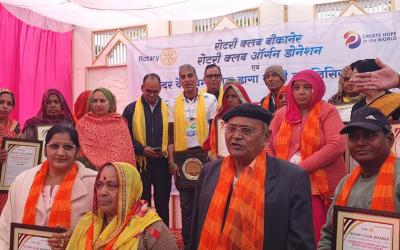
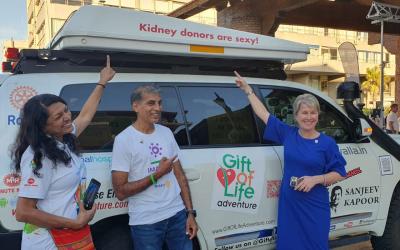
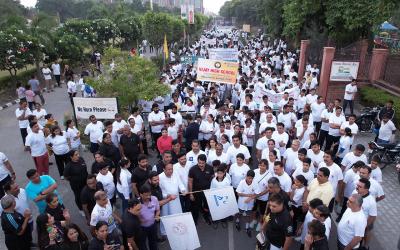
Rotary and Interact clubs in India, where members helped eliminate some restrictions on organ donation, are particularly active in promoting the cause. They educate people using expert speakers at club meetings, support from well-known Rotarians like RI Past President Jennifer Jones, and a walkathon that included many high schoolers. Courtesy of Anil Srivatsa
In India, the laws pose their own challenges. Until recently, citizens in some states could only register to receive a deceased-donor organ transplant in their home state. With the help of other Rotarians, Srivatsa successfully challenged the requirement through the nongovernmental organization he formed to coordinate international support of his work, the Gift of Life Adventure Foundation.
In Britain, instead of relying on people to sign up, under recent laws most adults are considered potential organ donors when they die unless they opt out. In 2021 the Rotary Club of Leicester Novus, England, hosted a speaker to explain the law.
For more than 20 years in Mexico, people have received help paying for kidney transplants through an initiative of the Rotary Club of Cuajimalpa. The project is supported by a nonprofit in the country, other Mexican clubs in District 4170, and U.S. clubs in zones 30 and 31, a slice of Middle America. Like many parts of the world, Mexico is experiencing increases in chronic kidney disease as two main causes, diabetes and high blood pressure, rise too. While kidney transplants are increasing, their high cost keeps them out of reach for a large portion of Mexicans. Rotarians have used multiple global grants for the project, guiding donors and recipients through the process leading up to the surgery and quelling fears about donors’ health afterward, similar to how Srivatsa counsels people in his travels across India.
Clubs in India have been particularly active promoting the issue, with education sessions for factory workers and college students, rallies of people with banners and flags who walk city streets, and events to encourage people to pledge to donate their organs when they die.
Srivatsa, who divides his time living in Bengaluru (formerly called Bangalore) and New Jersey in the U.S., has also done drives to counter transplant myths across Asia, Australia, Europe, and North and South America. He circles the globe to address business groups — in December he went to Bali to talk to Pepsi executives. He estimates he has spoken to more than 270,000 people in 58 countries on over 1,000 occasions, many of those at Rotary clubs. “Love gets thwarted by fear, and I believe fear comes from unanswered questions,” Srivatsa says. “What I’m trying to do is answer those questions. I don’t go out and tell people to become organ donors. That’s a decision they can make once they learn that the fear is misplaced.”
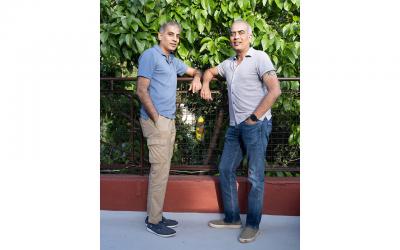
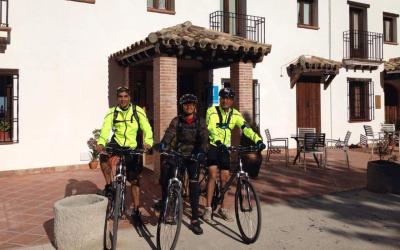
Left: Anil Srivatsa says his kidney donation to his brother, Arjun Srivatsa, was not a sacrifice. Image credit: Gayatri Ganju. Right: The Srivatsa brothers demonstrate healthy post-transplant life with grueling mountain biking and other physical challenges. Courtesy of Anil Srivatsa.
He helped start the Interact Club of Venky Yoda, which stands for youth organ donation awareness, at the Venkateshwar International School in Delhi. The Interactors worked with his club to launch a chatbot recently that teaches people about organ donation. Srivatsa, who has helped form two other clubs, also worked with the Rotary Action Group for Blood Donation to add organ donation to the group’s mission (and its name) to increase Rotary members’ focus on the issue. The group already has hundreds of members dedicated to supporting blood drives, so the expansion to include organ donation advocates will be a powerful force.
Srivatsa uses his experience of giving his brother a kidney to show that donors live normal, healthy lives. “When people say I sacrificed a lot to give a kidney to my brother, I don’t believe that was sacrifice,” he says. To demonstrate how active post-transplant life can be, the brothers took a grueling mountain bike tour in 2015, six months after their operations. They competed in the World Transplant Games in England in 2019 and in Australia in 2023, with medals for Arjun in golf and Anil in cricket ball throwing and race walking.
Removing hurdles
Despite grassroots efforts by Rotary members, the World Health Organization estimates that transplants cover only about 10 percent of need. Many people waiting for kidneys survive only through the debilitating process of dialysis, where their blood is cycled through a machine and washed of toxins that are usually removed by healthy kidneys. (See the author’s essay about helping his cousin on dialysis and trying to give him a kidney.) But dialysis isn’t available everywhere or is too expensive for many people around the world. In India and many countries, the use of organs donated from people who died is minuscule, and transplants are limited mostly to kidneys from living donors.
Among Rotary members with a personal link to the issue are Prashant and Hemali Ajmera, a couple in India who hit the legal hurdle requiring a residency certificate in Gujarat state, where Hemali Ajmera was getting dialysis treatments and needed a kidney transplant.
The two, who are both Canadian citizens, learned about the requirement in spring 2022 when Prashant Ajmera went to a Gujarat hospital to register his wife to receive a transplant from a deceased donor, he says. “I made the application, and in four days I heard back from the police department: Your wife is a Canadian citizen so is not entitled to a domicile certificate in the state of Gujarat. So the hospital will not take her as a patient.”
“As a lawyer, it didn’t make sense to me,” says Ajmera, a member of the Rotary Club of Ahmedabad Metro. He did his research and discovered that such residency requirements were a significant drag on the transplant rate nationwide. “It was not only a problem for me, but it was affecting people across India,” Ajmera says. A judicial petition by Hemali Ajmera succeeded, and Gujarat’s residency requirement was ruled unconstitutional in late 2022. Srivatsa’s NGO advanced a challenge to the highest court in India. “We used Anil’s foundation to file a class action,” Prashant Ajmera says. “It all happened because of Rotary.”
The federal government adopted a policy in March 2023 that forbids domicile requirements for those seeking deceased-donor organ transplants, along with lifting a ban on people older than 65 receiving such transplants. “Doctors came to me and told me this was the big hurdle, and it has been removed, making one less complication in the process,” says Ajmera, who speaks to Rotary clubs about the complexities of India’s organ donation rules.
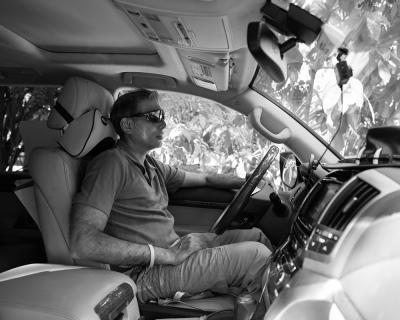
Srivatsa’s SUV is his home on the road for weekslong treks to reach Rotary clubs and anyone else he can gather to address hesitancy about organ donation.
Image credit: Gayatri Ganju
Srivatsa’s SUV is his home on the road for weekslong treks to reach Rotary clubs and anyone else he can gather to address hesitancy about organ donation.
Before the legal battle could be resolved, however, Hemali Ajmera’s condition deteriorated, forcing her to get a kidney transplant from a living donor — her sister. The operation was performed in February 2023 at a hospital recommended by a Rotarian doctor, and Hemali Ajmera later moved her membership to the Rotary Club of Organ Donation. “Rotary has helped me in all my life, connection after connection, doctor after doctor, all because of wonderful Rotary,” Prashant Ajmera says.
To help others in considering whether to donate, Srivatsa’s foundation published a book, A Rotarian’s Guide to Organ Donation, edited by Hemali Ajmera.
Prashant Ajmera pushes for Rotary members to play a wider role in promoting organ donation. No one expects progress to be easy, but members are in it for the long haul.
Srivatsa says members sprinkled in communities across the globe are in a strong position to push systemic changes that improve organ donation and get people’s attention on how to prevent conditions, such as heart disease and diabetes, that can lead to organ failure. “Me passing through, making one passionate speech then walking away is not optimum. You need someone on the ground always there pushing the agenda.”
This is an abridged version of a story that originally appeared in the August 2024 issue of Rotary magazine.
